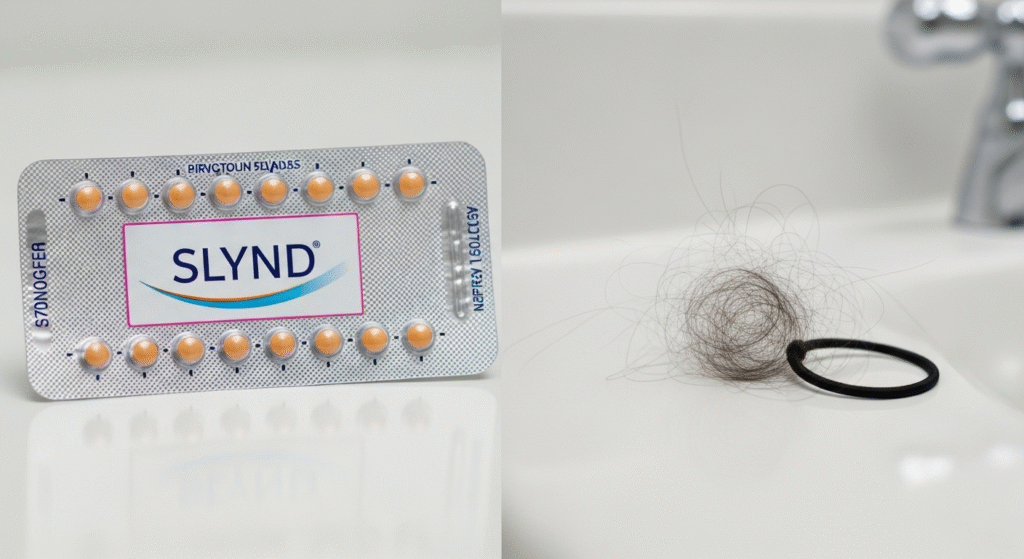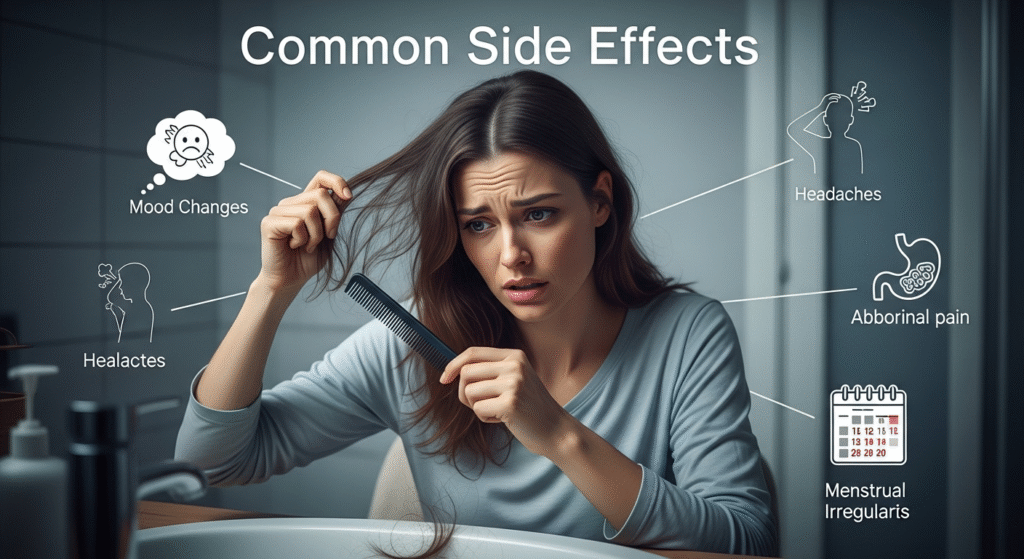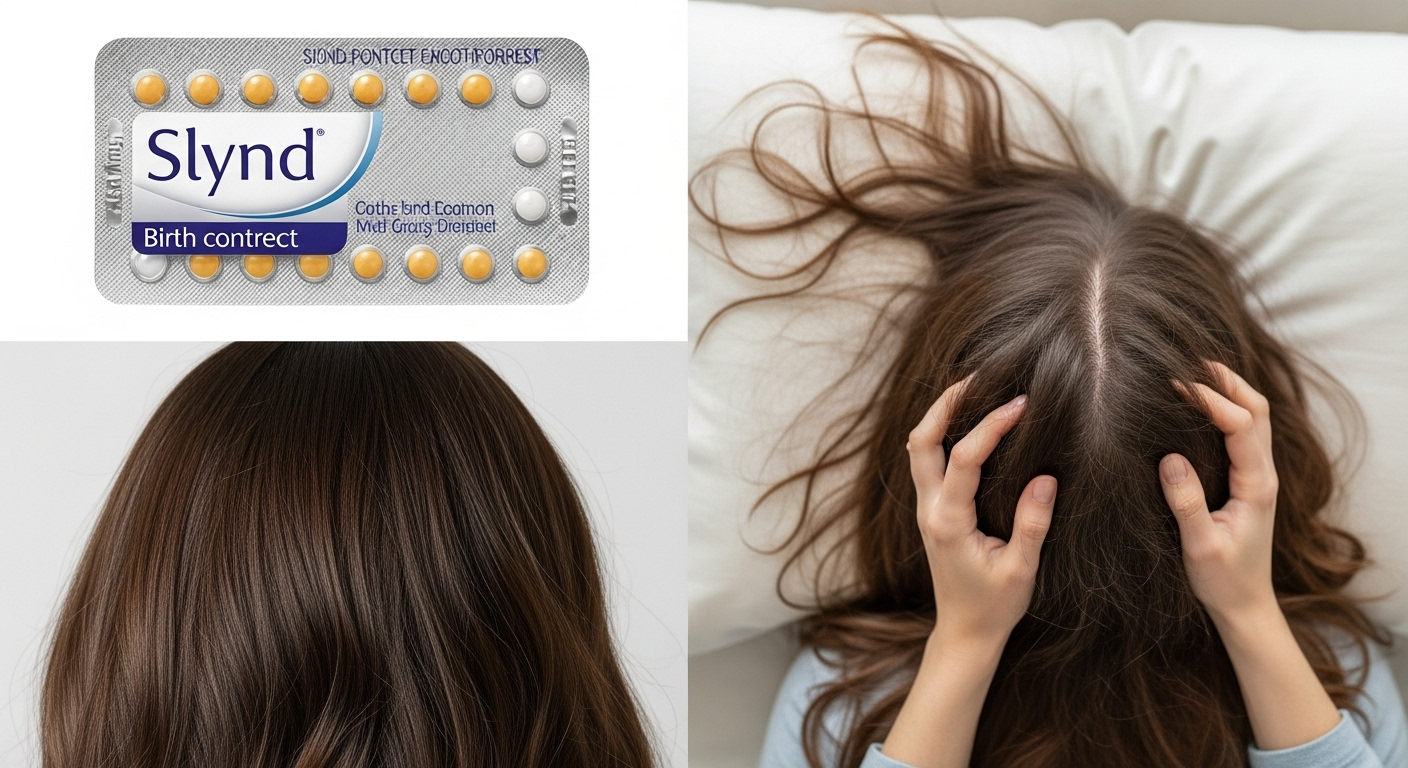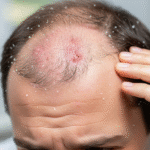If you’ve been using Slynd and noticed hair thinning, you might be wondering whether there’s a connection. Slynd is a popular birth control pill, but like many hormonal contraceptives, it may cause side effects such as hair loss. In this article, we’ll explore the relationship between Slynd and hair loss, the mechanisms behind it, and …
If you’ve been using Slynd and noticed hair thinning, you might be wondering whether there’s a connection. Slynd is a popular birth control pill, but like many hormonal contraceptives, it may cause side effects such as hair loss.
In this article, we’ll explore the relationship between Slynd and hair loss, the mechanisms behind it, and tips on managing hair thinning. By the end, you’ll have a better understanding of the issue and know what steps to take if you experience hair loss while on Slynd.

What is Slynd and How Does It Work?
Slynd is a prescription birth control pill that contains drospirenone, a synthetic progestin, and ethinyl estradiol, a form of estrogen. It works by preventing ovulation, thickening cervical mucus to prevent sperm from reaching an egg, and thinning the uterine lining to reduce the likelihood of pregnancy.
- How Slynd Differs from Other Birth Control Pills:
Unlike some other hormonal birth control options, Slynd does not contain traditional estrogen. Instead, it uses drospirenone, which has a unique profile that may offer certain benefits, such as less water retention and a reduced risk of blood clots. - Benefits of Slynd:
- Reduced risk of acne and unwanted facial hair
- Lower risk of blood clots compared to other progestin-only pills
- Shortened periods for many users
However, for some women, birth control pills like Slynd may come with side effects that affect their hair, leading to thinning or shedding.
The Link Between Slynd and Hair Loss: Is There a Connection?
Hair loss is a potential side effect of many hormonal birth control methods, and Slynd is no exception. But how exactly does hormonal contraception lead to hair thinning?
- Hormonal Changes and Hair Follicles:
Birth control pills, including Slynd, alter the natural hormonal balance in the body. These changes can affect the growth cycle of hair, leading to increased shedding or thinning. Slynd’s synthetic progestin, drospirenone, may influence hair follicles, causing hair to enter the shedding phase prematurely. - Why Hormonal Birth Control Can Cause Hair Loss:
The main reason birth control pills like Slynd may cause hair loss is the change in androgen (male hormone) levels. Although Slynd has a lower androgenic effect than some other birth control pills, it may still cause hair thinning in sensitive individuals. - Is It Common?:
Hair loss is a reported side effect, but it’s relatively uncommon. Some users experience mild hair shedding, while others may notice more significant thinning. If hair loss becomes noticeable or troubling, it’s important to consider other contributing factors such as genetics, stress, or underlying health issues.
Common Side Effects of Slynd: Hair Loss Among Them?

While hair loss is one of the side effects that may occur with Slynd, it’s important to consider it alongside other potential reactions.
- Other Common Side Effects:
- Acne: Some women experience clearer skin, while others may notice mild breakouts.
- Mood Swings: Hormonal changes can sometimes affect mood and emotional stability.
- Bloating and Water Retention: Drospirenone is less likely to cause water retention compared to other progestins, but some users still report mild bloating.
- Headaches and Nausea: These side effects tend to subside after a few weeks of use.
While hair loss can occur, it’s important to evaluate whether it’s the direct result of Slynd or another contributing factor.
How to Manage Hair Loss While on Slynd
If you notice hair thinning while using Slynd, don’t panic. There are several ways to manage the situation and promote hair growth.
- Consult a Healthcare Provider:
Speak with your doctor to rule out other causes of hair loss. Your healthcare provider may suggest switching birth control methods or offer other solutions. - Hair Growth Treatments:
- Minoxidil: This over-the-counter treatment can help stimulate hair growth. Apply it to the scalp as directed by your doctor.
- Supplements: Biotin and other vitamins may help strengthen hair and improve growth.
- Healthy Diet: Ensure your diet includes sufficient nutrients such as vitamins A, C, and D, zinc, and omega-3 fatty acids to support hair health.
- Switching Birth Control:
If you believe Slynd is causing hair loss, your doctor may recommend a non-hormonal form of birth control (e.g., copper IUD) or another hormonal option with a lower risk of hair thinning. - Hair Care Tips:
- Avoid harsh chemical treatments or excessive heat styling, as these can exacerbate hair thinning.
- Opt for gentle, sulfate-free shampoos and conditioners to reduce scalp irritation.
When to Seek Professional Help for Hair Loss from Slynd
Hair thinning caused by birth control is typically temporary, but if it becomes severe or persistent, it may require medical attention.
- Signs to Consult a Doctor:
- Excessive hair shedding that doesn’t stop after a few months of use
- Thinning hair that leads to noticeable bald spots
- A significant change in hair texture or quality
- If other signs of hormonal imbalance, such as irregular periods or severe acne, occur
A dermatologist or gynecologist can help determine whether Slynd is causing the hair loss or if other factors are involved.
Alternative Birth Control Options if Hair Loss Occurs

For those who experience significant hair loss with Slynd, exploring alternative birth control options might be the best route.
- Non-Hormonal Options:
- Copper IUD: A hormone-free option that prevents pregnancy without affecting your hair.
- Condoms or Diaphragms: Barrier methods that don’t involve hormones and have no impact on hair health.
- Low-Dose Hormonal Options:
- If switching to a different hormonal method, options like the low-dose pill or IUDs with progestin that have less impact on hair follicles may be beneficial.
Expert Tips for Hair Health While on Slynd
Maintaining healthy hair while using Slynd or any hormonal birth control is essential for preventing hair thinning.
- Healthy Scalp Care:
- Massage the scalp regularly to promote blood circulation and hair growth.
- Use a mild, nourishing shampoo to prevent scalp dryness or irritation.
- Nutrition:
- A balanced diet rich in vitamins and minerals is vital for hair health.
- Biotin and vitamin E are especially known for promoting hair growth.
- Minimize Stress:
Stress can exacerbate hair loss, so practicing relaxation techniques like meditation or yoga may help manage shedding.
FAQs
Can Slynd cause permanent hair loss?
No, hair loss caused by Slynd is typically temporary and reversible after discontinuing use or switching birth control methods.
How long does hair loss last after starting Slynd?
Hair loss may occur within the first few months of using Slynd, but it generally resolves within 6–12 months.
What can I do to stop hair loss while using Slynd?
Consult with a healthcare provider for advice. You may also consider using treatments like minoxidil or switching birth control methods.
Is there a birth control that doesn’t cause hair loss?
Non-hormonal birth control options like the copper IUD do not affect hair growth. Some low-dose hormonal methods may also have a reduced risk.
Conclusion: Understanding Slynd and Hair Loss
While Slynd can cause hair thinning in some women, it’s usually temporary. By understanding the potential connection and managing it with the right approach, you can maintain healthy hair while using birth control. Consulting with a healthcare provider is key to addressing hair loss and exploring suitable alternatives.
Book a Consultation to Discuss Birth Control and Hair Loss
If you’re experiencing hair loss while using Slynd or any other hormonal birth control, consult a specialist today. Book a consultation with Dr. Uzma Irfan, an ISHRS-certified surgeon in Islamabad to discuss your options for managing hair loss and finding the best birth control method for your needs.






